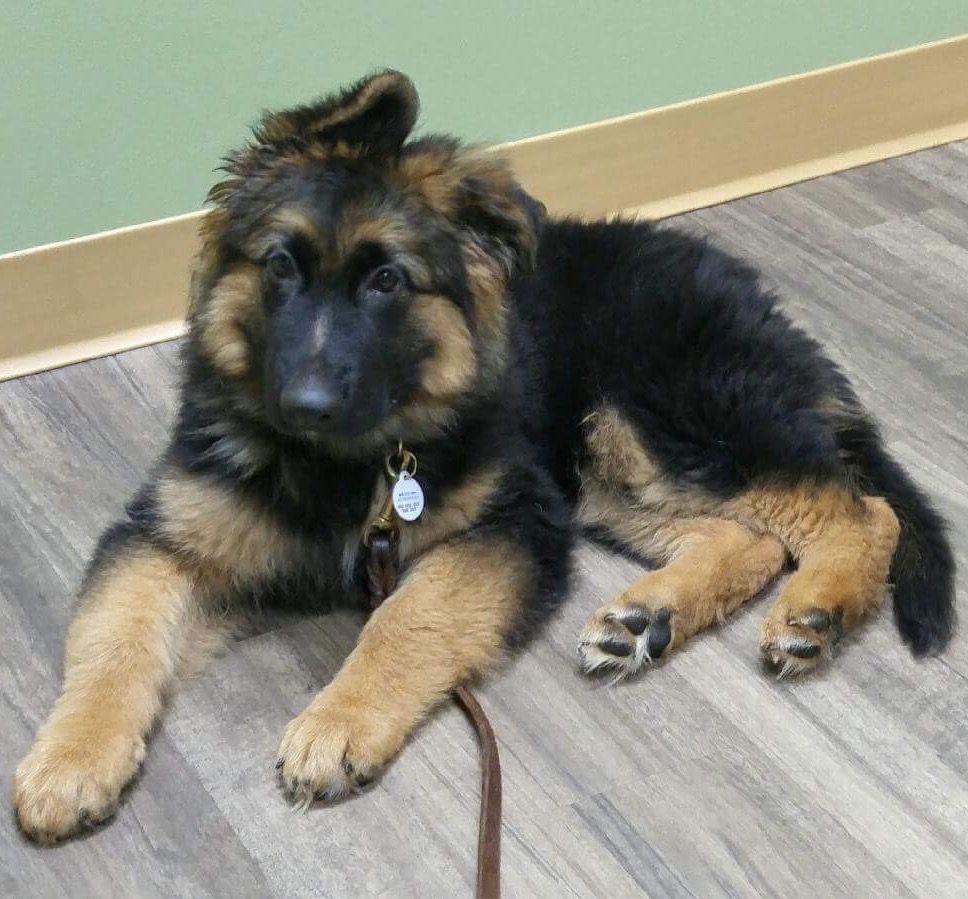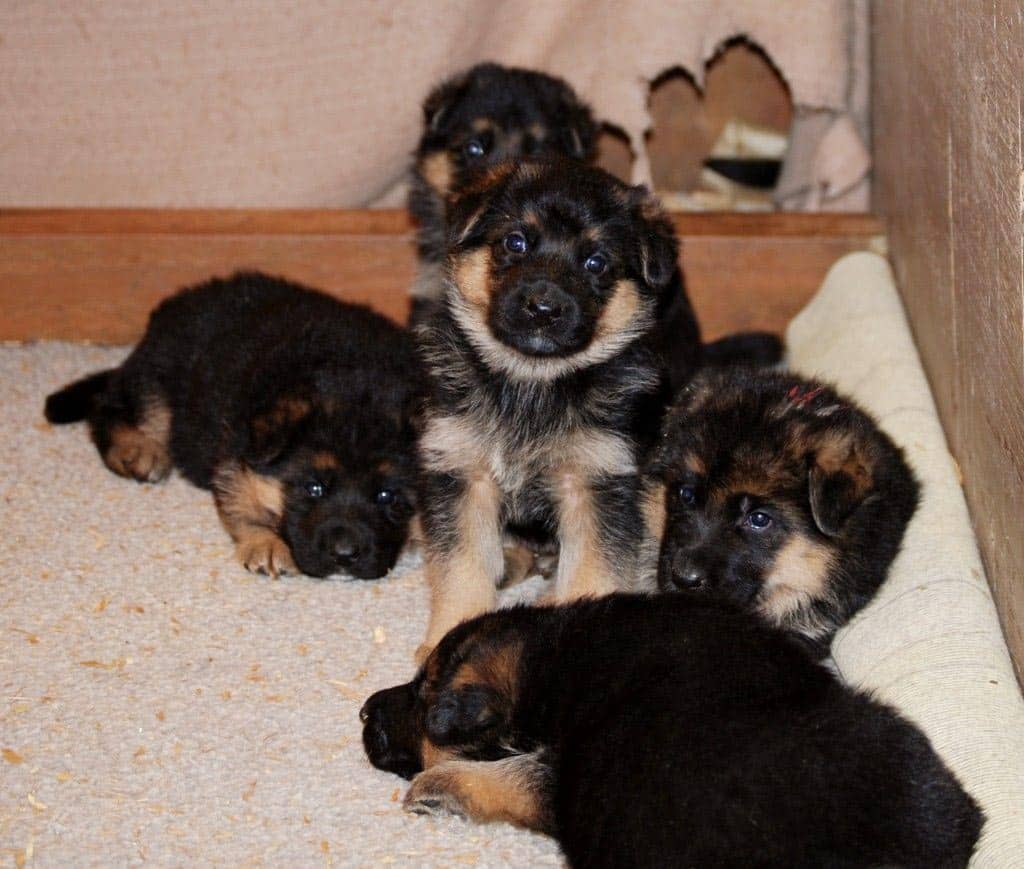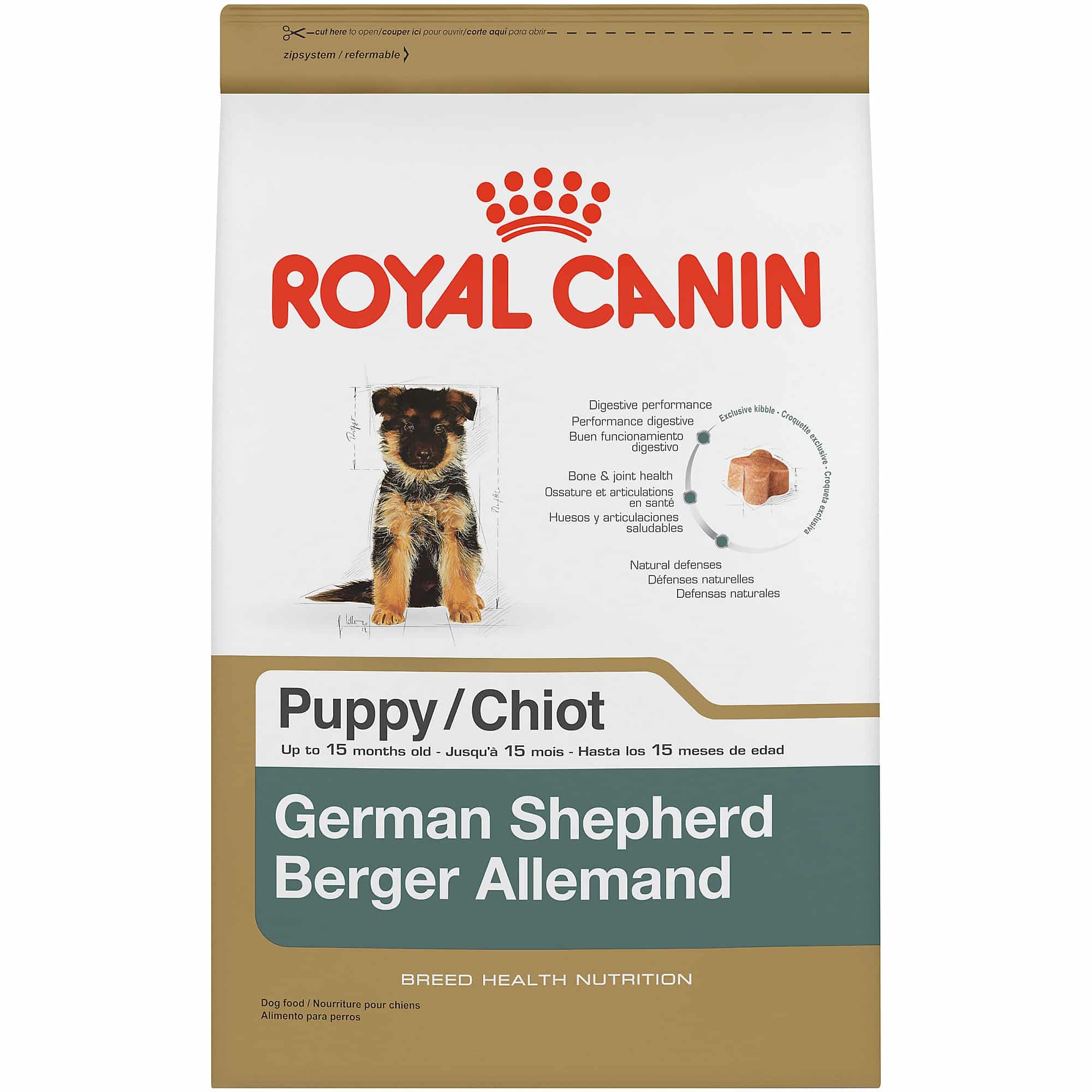German Shepherd Puppy Feeding Guidelines
Here are some general German Shepherd puppy feeding guidelines that may be helpful to consider as you plan your puppys menu:
- Puppies typically need to eat more than adult dogs.
- The puppy diet is usually higher in fat and protein than the adult dog diet.
- A good puppy food will always meet these two criteria: it is formulated for large breed puppies AND it offers complete and balanced nutrition.
- Do not provide extra vitamins and minerals unless your veterinarian advises otherwise.
- Puppies generally eat at least three times per day, whereas adult dogs may eat twice or even just once per day.
- Puppies always need access to plenty of fresh water during and in between meals.
- A common age to switch GSD puppies from puppy food to adult dog food is 12 months.
Should You Feed A German Shepherd Puppy Supplements
Required Vitamins and minerals are an essential part of a puppys diet. This is invaluable to a healthy puppys growth. If you want your dog to have healthy skin and a shiny coat, you should feed him vitamin A. You can give him vitamin E to help support his immune system.
Minerals act as a supplement to the vitamins and also ensures the healthy general function of your German Shepherds entire anatomy.
You need to be aware that just of the best vitamins and minerals for your German Shepherd puppy by visiting your vet and assessing his overall health.
German Shepherd Feeding Chart By Age: How Much To Feed Your German Shepherd
Like any other breed, your dogs diet varies in different stages of its life. A puppy may need to be fed more frequently than adult dogs, and they may also have differences in nutritional needs.
Weve provided you with feeding charts in this section to help you plan your dogs meal and food intake from puppyhood to adulthood.
However, it is essential to note that this is not a one-size-fits-all guide for feeding your German Shepherd. It should be adjusted depending on your dogs needs and the recommendation of your pet nutritionist or dogs vet.
Generally, German Shepherds need high-quality food to maintain their large stature, strong teeth, high energy, stunning coats, and healthy bones. A full-balanced healthy diet is vital in all of its life stages.
Also Check: Husky And German Shepherd Mix For Sale
Sleep Requirements For A 3
A 3-month-old German Shepherd puppy sleeps for approximately 16 to 20 hours daily. Adult German Shepherds should get between nine and fourteen hours of sleep each night.
However, its not unusual for your puppy to wake up at night. Their longest sleep is usually right before dawn.
Older German Shepherd dogs usually sleep less during the day and more at night. Their sleeping patterns will alter as they become older. When a dog reaches a specific age, he may begin taking daytime naps.
Also read:
German Shepherd Puppy Feeding Guide: 12 Weeks To 6 Months

After approximately 12 weeks of age, puppies can be trained to eat fewer meals a day, at set times, and with set amounts.
While you still dont want to limit their food too much at this age, its also not a good idea to just let them pig out whenever they want.
Large breed puppies have a tendency to overeat, and concerned puppy parents often give in to their pups cries for more.
This sets your German Shepherd up for obesity, heart problems, liver issues, joint pain, and a host of other medical conditions.
Instead of letting your puppy have a free-for-all on a bag of kibble, ask your vet what they recommend. Theyll look at your German Shepherd puppy as an individual as well as considering the breed as a whole.
The vet will also consider the pups overall health, activity level, and metabolism.
While your vets recommendation should overrule anything you read online, here is a decent middle ground feeding guide for most German Shepherd puppies.
This potbelly baby stage means she is not quite mature enough for reduced feedings.
Watch her body composition, shape, and weight. When she starts to look more like an older puppy and the potbelly is slimming down, you can reduce the feedings to 3 per day.
Don’t Miss: How Much Should A German Shepherd Weight
How Much Should A German Shepherd Puppy Eat
On average, adult German Shepherds should eat at least 1,272 calories to 2,100 calories daily. This amount depends on their age, existing health conditions, and activity level. Older and less active German Shepherds eat around 1300 calories daily to maintain a healthy weight. Meanwhile, an active and energetic older GSD may eat at 1700 calories a day.
But what about a German Shepherd puppy?
How much should a German Shepherd puppy eat?
The answer will surprise you!
German Shepherd puppies eat twice the amount of calories per pound of weight when compared to adult German Shepherds. This means an 8-week-old German Shepherd puppy can eat double the food of an adult GSD! Puppies eat double their adult counterparts in order to maintain growth and development. Their caloric intake is crucial to keep their bodies strong and give them necessary energy to grow.
A German Shepherd puppy that is younger than four months old will need at least 80-90 calories per pound of body weight in order to grow and develop. Once a German Shepherd puppy reaches four months of age, then you can reduce his calorie requirements to around 40-60 calories per pound of body weight. Weigh your puppy routinely, check on their overall body condition, and adjust their calories to support their growth.
Remember, calories vary greatly between brands and manufacturers. Always read the feeding label and nutritional guidelines on the package of food you are feeding your GSD.
Feeding A German Shepherd By Age
Age plays a great role in your choice of food amounts and feeding style. The information you will find below is a sort of recommendation. You also need to talk to your vet before you start the feeding program or make any changes to it.
All in all, an adult German Shepherd should consume 1,275-2,150 calories per day. Older and slower dogs can receive about 1,350 calories, not to gain weight. Though, older Shepherds that are still active and energetic may need around 1,700 calories.
Nevertheless, how much to feed a German Shepherd puppy? The answer is pretty surprising. Puppies need twice as many calories per day as adult dogs. For example, a little one aged only 10 weeks can eat double amounts of food in comparison with an adult GSD, related, of course, to their size and weight. It happens because puppies need a lot of calories to grow and develop.
When a puppy is four months old, its intake of calories slowly decreases. To compare, while a one-month-old puppy needs 80-90 calories per pound of weight, a four-month-old doggie will consume only 40-60 calories. You need to weigh your puppy every day to follow the growth progress and the overall body condition.
Lets consider the number of calories your puppy may need by its age in this German Shepherd puppy feeding chart:
| Age of a Puppy |
|---|
| 3,300-4,250 calories |
Now, lets speak about the GS puppys needs according to its age.
Recommended Reading: How To Sketch A German Shepherd
Dont Let Your Dog Exercise After Feeding
Your pup needs the time to digest the food. Avoid playing hard with it immediately after feeding. You need to wait at least 2 hours before any energetic activity because heavy exercising can lead to severe gastric problems. Instead, you can offer your pet a slow walk, without running, if it is possible.
Or you can start teaching your puppy balance skills and coordination with some quiet games. These gentle exercises can help your little one avoid injuries, keep their joints healthy, and learn how to socialize.
How Much Food To Feed A 13
You should feed your 13-week-old German Shepherd Dog puppy 3.6 cups of dry dog food every day.
You may divide this food into two or three separate meals and give it to your German Shepherd Dog puppy over the day.
Our recommendation on how much food should feed your 13-week-old German Shepherd Dog puppy assumes that the weight of your German Shepherd Dog is typical for its age.
The typical weight for a 13-week-old German Shepherd Dog puppy is 27.2 lbs .
Our recommendation on how much food you should feed your German Shepherd Dog also assumes that you feed your German Shepherd Dog a dog food with a calorie content of 389 kcal per cup.
If you want a more accurate estimation of how much food to feed your German Shepherd Dog puppy based on its exact weight, the exact type of dog food that you feed your German Shepherd Dog, and other factors, use our German Shepherd Dog food calculator.
Read Also: How To Train A German Shepherd To Attack
Is My Puppy The Right Weight
You can also refer to German Shepherd puppy growth charts to see if you puppy is gaining weight and within the normal range.
However, keep in mind that some dogs will be unusually small or large but still be perfectly healthy.
Do not try to maximize growth rates as this can lead to health problems later.
But if you puppy is not showing a steady increase in size, or your puppy lacks appetite, consult with a veterinarian.
Ensure that you are familiar with how to assess the body condition of your puppy. You can ask about your puppys condition at veterinary wellness examinations.
German Shepherd Puppy: Dog Food And Water Bowl Hygiene
Your puppy’s food and drink containers should always be clean. Hygiene is very important in order to prevent the appearance of insects. If there are insects in your dogs water, it could cause your German Shepherd puppy to suffer from intestinal parasites.
If you notice that your puppy has not eaten for three consecutive meals, consult your veterinarian immediately. This lack of appetite in a puppy could be caused by bowel obstruction and stomach pain due to the ingestion of toxic food etc. Don’t forget that puppies are very sensitive and fragile and if you ignoring any symptoms of disease, it can result in severe issues or even puppy fatality.
Don’t Miss: What Size Furminator For German Shepherd
What To Do If Your Gsd Puppy Is Underweight
If you suspect that your German Shepherd puppy is underweight, schedule an appointment with your vet as soon as possible. Your veterinarian will be able to determine whether your puppy is truly underweight and either confirm your suspicions or put your mind at ease.
While insufficient food can cause a puppy to become underweight, many different health problems may also be to blame. Thus, its very important to get your puppy to the vet.
Week Old German Shepherd Puppy

At 2 weeks old, your German Shepherd puppy will still be with his mother. He should be reliant entirely on his mothers milk. These small pups will begin to open their eyes to take in the world, but otherwise will not be straying anywhere.
In larger litters, make sure that all of the puppies are growing and gaining well. Pups that dont seem to be getting enough milk might need to have formula supplemented to them in order to get their weight up to a healthy level. If you are worried about this at all, contact your veterinarian.
Don’t Miss: How Many Years Does German Shepherd Live
Foods To Avoid Feeding Your German Shepherd
Since German Shepherds have large appetites, we must always be mindful of what goes inside their mouths. They tend to eat whatever falls from the dinner table or even whatever food they set their sights on.
As we talk about food diets, we must not forget those foods you must avoid feeding your German Shepherd puppy. Generally, they may not be too sensitive to dog foods or ingredients, but other foods may be fatal to them.
Firstly, lets tackle food and ingredients that can be fatal to German Shepherds, even if its ingested in small amounts.
Coffee is one of the most toxic foods to dogs. They contain caffeine, which causes cardiac arrhythmias, high blood pressure, vomiting, tremors, and seizures.
If youre a coffee-lover, make sure you have a secure place to store it away from your pup.
Another toxic food German Shepherd owners should not feed their dog is chocolate. As yummy as this is, chocolates contain theobromine. All dog breeds cannot metabolize this substance. Thats why its poisonous to them.
Gums, peanut butter, and candies that contain xylitol are also toxic to dogs. It causes disorientation, hypoglycemia, seizures, and collapse.
This is much more threatening than coffee and chocolate, so you need to be extra careful with this.
Aside from those mentioned above, there are many other toxic foods you should avoid feeding German Shepherds. They may not be fatal, but they can cause discomfort and progress to severe diseases.
What Foods Are German Shepherds Allergic To
German Shepherds are known to be allergic to a variety of things, including wheat, corn, soy, and even some meats. If you’re not sure what your German Shepherd is allergic to, it’s always best to consult with your veterinarian. They will be able to recommend the best food for your dog based on their specific allergies.
If your German Shepherd is having any sort of adverse reaction to their food, such as scratching, biting, or licking themselves excessively, then they may be allergic to something in their food.
Consult with your veterinarian if you’re not sure what’s causing the reaction. They will be able to recommend the best food for your dog based on their specific allergies.
Also Check: Are German Shepherds Good Guard Dogs
Monitor Weight & Health
You must monitor your German Shepherds weight as you transition to a homemade food diet.
Follow your GSDs weight and health closely for about a month to ensure that she is not adversely affected by this new diet.
An unbalanced diet can lead to excessive energy, skin or coat disorders, allergies, weight loss, malnutrition, or obesity. If you notice these symptoms, stop feeding your GSD this food immediately and consult a professional dog nutritionist.
What Nutrients Do German Shepherd Puppies Need
Puppies should eat about 500 calories daily, increasing to about 1,600 calories around 15 or 16 months old. Adults will need between 1,700 calories and 2,400 calories every day. Senior dogs require less, between 1,300 and 1,600 a day. Owners need to read labels and consider all the different needs their pup has when choosing what to feed them.
Read Also: What Kind Of Food To Feed German Shepherd Puppy
Feeding Guide For The Young Adult German Shepherd Dog: Ages 1 Year To 6 Years
The dog food that you feed a young adult German Shepherd Dog should have the nutrients that will make a dog live longer.
A good dog food for the young adult German Shepherd Dog should also have the nutrients that will minimize the chances of your German Shepherd Dog getting infected with common dog diseases.
Also, a good dry dog food for the young adult German Shepherd Dog should help clean your dog`s teeth as your dog chews on the food.
Below is our best dog food recommendations for the young adult German Shepherd Dog
How Much To Feed A German Shepherd Puppy: Our Guide
Wondering how much to feed a German Shepherd puppy? Weve got the answers!
From the day you bring them home, to the time they move onto adult food.
After all, the typical GSD puppy feeding guide can change almost daily as your puppy grows bigger and stronger!
Puppyhood may be all too short, but it is a critically important time for your new puppys adult health and well-being.
In this article, we take an in-depth look at the German Shepherd puppy food diet.
Giving you trustworthy German Shepherd puppy feeding guidelines to supplement instructions given by your puppys breeder and veterinarian.
Also Check: How Long Do German Shepherds Grow
What Is The Best Food For German Shepherds With Joint Problems
If your German Shepherd has joint problems, you’ll want to find a dog food that is rich in omega-three fatty acids. These essential nutrients help to reduce inflammation and pain in the joints.
There are many brands of dog food that offer formulas specifically for dogs with joint problems. These foods often contain ingredients like glucosamine and chondroitin, which are known to help relieve joint pain.
Now let’s chat in more detail about the best dog foods for your furry friend.
When To Switch From Puppy To Adult Food

Puppy foods tend to contain more nutrients and calories than adult food, to meet the nutritional requirements of your dog. As such, whether you feed a dry or wet variant, the puppy food you give will have higher levels of protein and fat. If you continue to feed this to an adult dog, they will be more prone to put on weight because of the high fat content. Moving over to adult food is an important stage in your dogs development.
Small breed dogs are usually fully mature by around 10 months, medium dogs by 14 months, but large breed dogs can take up to 24 months to fully mature.
With your German Shepherd, wait until he reaches around 80% of his anticipated adult weight before making the transition to adult food.
- Feed ¾ puppy food and ¼ adult food for the first week.
- Feed ½ puppy food and ½ adult food for the second week.
- Feed ¼ puppy food and ¾ adult food for the third and final week of the transition.
Read Also: How Much Should A 6 Month Old German Shepherd Eat